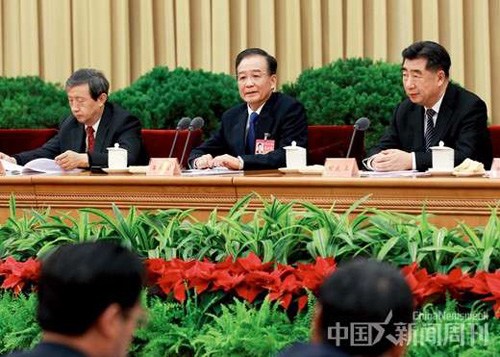
Premier Wen Jiabao at the annual central conference on rural work on December 27, 2011.
(Ecns.cn)--"To accelerate the reform of collective land acquisition policies, it is critically important to protect the property rights of the farmers and recognize and compensate them for the value their land gained during urbanization and industrialization," pointed out Premier Wen Jiabao at the annual central conference on rural work on December 27, when policies for next year's agricultural and rural developmentwere being mapped out.
As urbanization in China increases in speed, more and more rural land is being taken over, provoking conflict between the nation's government and its farmers.
Since 2009, cases of farmers burning themselves in protest at forced demolition orders have prompted some scholars to file a proposal to law-makers, advising more care with the legitimacy of demolition regulations.
The Legislative Affairs Office of the State Council published a draft amendment to the existing regulation to seek public opinions on the matter in January 2010.
According to China Daily, the draft amendment stipulates that houses can only be demolished to serve "the public interest," and residents must be paid full compensation before they move out. Relocations can take place if and when at least 90 percent of the residents agree with the compensation proposal.
However, "how is 'public interest' defined?'" questioned china.org.cn. Whatever the purpose, local governments are adept at finding plausible excuses to disguise a cash grab, the website pointed out.
Shen pointed out many local governments believe bulldozing down urban villages accords with the public good, similar to old city rebuilding projects which acquired houses on state-owned land. "Of course, some of these might have declined into slums if not rebuilt. But does that apply to every case? Does it really benefit the majority?"
"China is huge, with different regions in different development phases. Some underdeveloped areas still need construction to propel the local economy, and local governments in those regions may find it difficult to implement the amendment limiting land grabs if it is passed," ShenKui, a law professor at Peking University, told the China Daily.
"We're not against urbanization or development, which has already become an irreversible trend in the modern world, but it should be a gradual not a rapid process, and during that process, people's rights, especially the rights stipulated by law, should not be trampled on," Shen added.
At this, Wen noted at the conference that "farmers are granted land contract management rights by law, residential land use rights, and rights to collective earnings distributions. Nobody can deny farmers their lawful property rights, no matter whether they are living in rural areas or in cities."
"The central government took a clear-cut stand on the protection of farmers' property rights," commented Xu Xiaoqing, researcher from Development Research Center of the State Council.
"A plan for the reform of land acquisition policies should be well devised, and related regulations must be promulgated in 2012," Wen stressed.
"Now an overall development plan would be taken into consideration during the land acquisition process Xu Xiaoqing said, explaining, "Farmers as the original owners have been excluded from the benefits gained by their land being expropriated, but now in the concept of a farmer's property rights there is a strong trend to include a share of the added value of the land
"It is inevitable that some rural land will be taken over during urbanization and industrialization, but the practice should be more disciplined and the will of the farmers, and their rights, be fully respected," Xu added. "Industrialization, urbanization and agricultural modernization are lengthy processes, thus should not be advanced by 'forcing a donkey to dance' at the expense of the nation's farmers."

Copyright ©1999-2011 Chinanews.com. All rights reserved.
Reproduction in whole or in part without permission is prohibited.